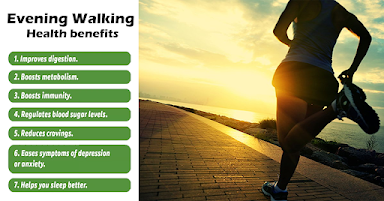The Magic of Evening Walks: A Simple Habit for a Healthier Life
Introduction
Imagine this: The sun is setting, a cool breeze touches your face, and you’re walking at a relaxed pace, leaving behind the stress of the day. Sounds refreshing, right? An evening walk is one of the simplest yet most powerful habits that can transform your health and mind.
While mornings are often rushed and packed with tasks, evenings give us a chance to slow down, reflect, and take care of ourselves. Whether you’re walking alone, with a friend, or even with your pet, this small habit can bring big health benefits.
So, let’s dive into why evening walks are amazing and how you can make them a part of your daily routine!
1. A Natural Stress Buster
After a long day of work, studies, or household chores, stress can take over. Evening walks act like therapy, allowing you to disconnect from worries and recharge mentally. Walking releases endorphins (happy hormones), which naturally improve your mood and reduce anxiety.
💡 Tip: Listen to calming music or a podcast while walking—it enhances relaxation!
2. Helps with Digestion and Weight Loss
Feeling bloated or heavy after dinner? That’s because our body needs movement to digest food properly. A 30-minute walk after your meal helps with digestion and prevents problems like acidity, bloating, and indigestion.
🚶♂️ Walking also burns calories, which helps with weight management. If losing weight is your goal, evening walks can be your secret weapon!
💡 Tip: Make it a habit to take a stroll 20–30 minutes after dinner for maximum digestive benefits.
3. Improves Heart Health
Your heart loves it when you walk! Regular evening walks improve blood circulation, control blood pressure, and reduce the risk of heart disease. It also helps in maintaining cholesterol levels and keeps your heart strong.
💖 Remember: A brisk walk for 30 minutes can do wonders for your heart!
4. Enhances Sleep Quality
Struggling with sleepless nights? Scrolling on your phone in bed won’t help, but an evening walk will! Walking releases tension from your body and promotes the production of melatonin, the hormone responsible for good sleep.
🌙 A short walk before bedtime can help you sleep faster and deeper.
💡 Tip: Avoid intense exercise too late at night, as it can make you feel too energetic to sleep. Stick to light walking in the evening.
5. Boosts Mental Clarity and Creativity
Ever noticed how fresh ideas pop into your mind when you take a walk? That’s because walking improves brain function and boosts creativity. If you’ve had a mentally exhausting day, an evening walk will help clear your thoughts and bring new perspectives.
🚶♀️ Walking in nature or a peaceful park enhances these effects even more!
💡 Tip: If you feel stuck in your work or studies, take a quick walk to refresh your brain.
6. A Social Bonding Opportunity
Evening walks are not just about fitness—they’re also a great way to spend quality time with loved ones. Whether it’s your partner, kids, parents, or friends, a walk allows you to talk, laugh, and connect without distractions.
🐶 Have a pet? Walking with your dog is a fantastic way to enjoy companionship and stay active together!
💡 Tip: Invite a friend or family member for an evening walk—it keeps you motivated and makes it more enjoyable!
7. Helps Control Blood Sugar Levels
For people with diabetes or those at risk, an evening walk can be a simple yet effective way to control blood sugar levels. Physical activity helps the body use insulin better, preventing spikes in blood sugar.
👟 Even a 15-minute walk after dinner can have a positive impact on blood sugar control.
💡 Tip: If you have diabetes, consult your doctor about the best walking routine for your health needs.
How to Make Evening Walks a Habit?
Now that you know the benefits, how can you make evening walks a consistent habit?
✅ Set a Time: Choose a specific time for your walk, such as right after dinner or before bedtime.
✅ Pick a Route You Love: A nearby park, a peaceful street, or even your apartment complex—find a place where you feel comfortable.
✅ Make it Enjoyable: Listen to music, a podcast, or an audiobook. You can even practice mindfulness by focusing on your breath and surroundings.
✅ Start Small & Stay Consistent: Even 10-15 minutes is a great start! Gradually increase the time as you get comfortable.
✅ Find a Walking Buddy: Walking with someone keeps you accountable and makes it more fun!
Conclusion: Take That First Step!
An evening walk is more than just physical exercise—it’s a moment of self-care, relaxation, and reflection. With so many benefits for your body and mind, why not make it a part of your daily routine?
So, lace up your shoes, step outside, and enjoy the magic of evening walks! Your health will thank you. 🚶♂️💙

This is such a delightful and inspiring post! I love how it highlights the simple yet powerful benefits of evening walks — from boosting physical health and reducing stress to clearing the mind and improving sleep quality. It’s refreshing to see practical wellness tips that anyone can include in their daily routine, and your clear, thoughtful presentation makes the idea feel both achievable and enjoyable. Thank you for sharing such a positive reminder of how small habits can make a big difference in our wellbeing! 😊
ReplyDelete